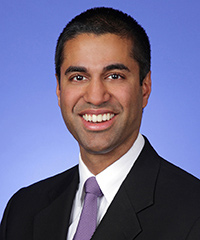Call Authentication Framework Moving Forward with 2019 Target for Implementation
November 6, 2018 - WASHINGTON - FCC Chairman Ajit Pai on Monday demanded that the phone industry adopt a robust call authentication system to combat illegal caller ID spoofing and launch that system no later than next year. Such a system is critical to protecting Americans from scam robocalls.
Such a system is critical to protecting Americans from scam robocalls.“Combatting illegal robocalls is our top consumer priority at the FCC. That’s why we need call authentication to become a reality—it’s the best way to ensure that consumers can answer their phones with confidence. By this time next year, I expect that consumers will begin to see this on their phones,” said Chairman Pai. “Carriers need to continue working together to make this happen and I am calling on those falling behind to catch up. I also thank the many providers that are well on their way toward implementation. Greater participation will ensure the system works for consumers, who expect real progress in combatting malicious spoofing and scam robocalls. If it does not appear that this system is on track to get up and running next year, then we will take action to make sure that it does.”
Specifically, Chairman Pai sent letters to voice providers this afternoon. In particular, he asked those that apparently have not yet established concrete plans to protect their customers using the Signature-based Handling of Asserted Information Using toKENs (SHAKEN) and the Secure Telephone Identity Revisited (STIR) standards to do so without delay. Under the SHAKEN/STIR framework, calls traveling through interconnected phone networks would be “signed” as legitimate by originating carriers and validated by other carriers before reaching consumers. The framework digitally validates the handoff of phone calls passing through the complex web of networks, allowing the phone company of the consumer receiving the call to verify that a call is from the person supposedly making it.
His letters also pose questions to providers regarding implementation plans, highlighting the importance of private actors to combat illegal spoofing and unwanted and unlawful robocalls. Chairman Pai also thanked those companies that have committed to implementing a robust call authentication framework in the near term.
The Commission and industry have made significant progress in developing a call authentication framework. Starting with a formal inquiry in July 2017, the FCC sought public input on the best way to establish a reliable system to verify caller ID information. Then, in May 2018, Chairman Pai accepted the recommendations of the North American Numbering Council for implementing SHAKEN/STIR.
Industry stakeholders have now completed the first step of this process—formation of the governance authority for implementing SHAKEN/STIR. The governance authority is a stakeholder group established to determine the policies by which a carrier and its calls are considered trusted enough to “sign” calls originating on their networks. Next, a policy administrator will be established to certify carriers that are authorized to approve a call as legitimate. Finally, certification authorities will be chosen to provide the “keys” that digitally stamp a call as legitimate. Although some carriers are expected to start signing calls even before this process is complete, operationalizing this system will help all carriers sign calls, attesting to their validity from start to finish—and conversely, making clear which calls are not valid.
Looking ahead, Chairman Pai expects this effort to move forward as quickly as possible to protect consumers. Industry has been making progress, but success requires sustained investment in this next-generation call authentication standard. If industry starts to fall behind, the Commission stands ready to ensure widespread deployment to hit this important technological milestone.
A robust call authentication framework is part of the Commission’s multi-pronged effort to combat the scourge of spoofed robocalls that American consumers know all too well. A robust call authentication framework would erode the ability of callers to illegally spoof their Caller ID, which scam artists use to trick Americans into answering their phones when they shouldn’t. With a robust framework in place, consumers and law enforcement alike could more readily identify the source of illegal robocalls and reduce their impact. And the Commission is considering additional actions—such as authorizing voice providers to block the delivery of unsigned or improperly signed calls to consumers—that would stem the flow of illegally spoofed robocalls to American consumers.
Source: FCC








